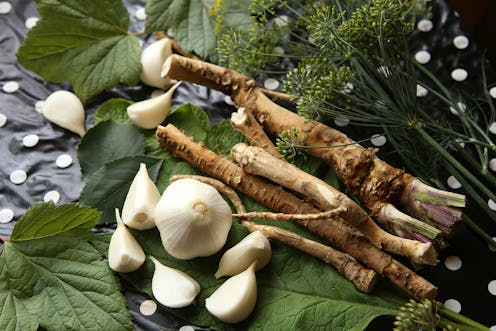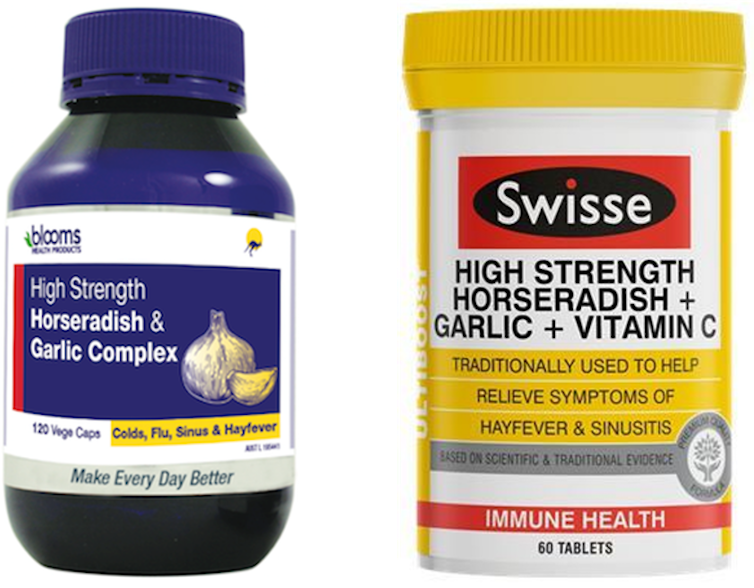Science or Snake Oil: will horseradish and garlic really ease a cold?
- Written by Ken Harvey, Associate Professor, School of Public Health and Preventive Medicine, Monash University
 Horseradish hasn't been studied, and studies on garlic found it probably does nothing. from www.shutterstock.com
Horseradish hasn't been studied, and studies on garlic found it probably does nothing. from www.shutterstock.comSome of us may have heard that horseradish and garlic supplements help ease cold and flu. Blooms High Strength Horseradish and Garlic Complex claims it has
a soothing antimicrobial action that helps fight off the bugs that can cause colds and flu and provides symptomatic relief from upper respiratory tract infections.
Others, such as those promoted by Swisse and Blackmores, claim to be “traditionally used in Western Herbal Medicine to provide symptomatic relief of sinusitis, hay fever and upper respiratory tract infections”. And the Swisse and Blackmores products (and many others) add additional ingredients, commonly vitamin C, which is claimed to be beneficial for “immune health”.
There are two categories of “evidence” allowed by the Therapeutic Goods Administration (TGA) to validate indications or claims made for complementary medicines: scientific or traditional.
Scientific evidence is based on the scientific literature, such as trials in humans. Traditional evidence is based on theories outside modern conventional medicine, such as Western herbal medicine, traditional Chinese medicine and homeopathy.
Read more - Science or Snake Oil: can turmeric really shrink tumours, reduce pain and kill bacteria?
So, what does the research say?
A search of the medical journal database PubMed failed to find any clinical trials on the combination of horseradish (Armoracia rusticana) and garlic (Allium sativum), with or without vitamin C. Nor were any clinical trials found on horseradish alone.
The authors of a 2014 Cochrane review concluded there was insufficient clinical trial evidence supporting garlic in preventing or treating the common cold. A single 2001 trial (from the Garlic Centre in the UK) suggested garlic may prevent the common cold, but more studies were needed to validate this finding. Claims of effectiveness appear to rely largely on poor-quality evidence.
A 2013 Cochrane systematic review explored whether taking vitamin C (0.2g a day or more) reduced the incidence, duration or severity of the common cold. The 29 trial comparisons involving 11,306 participants found taking vitamin C regularly failed to reduce the incidence of colds in the general population.
 Supplements can claim they’re a traditional medicine, meaning they don’t have to prove they’re effective.Screenshot, Author provided
Supplements can claim they’re a traditional medicine, meaning they don’t have to prove they’re effective.Screenshot, Author providedRegular supplementation had a modest effect in reducing the duration of common cold symptoms by a few hours. The practical relevance of this finding is uncertain. The authors felt this level of benefit did not justify long-term supplementation. Finally, taking vitamin C at the onset of cold symptoms was not effective.
Vitamin C deficiency can impair immune function, but this is uncommon in Australia and best prevented by eating fruit and vegetables.
Read more - Monday’s medical myth: vitamin C prevents colds
The TGA accepts a traditional indication if that use has been recorded in internationally recognised traditional sources for a period of use that exceeds three generations (75 years). Traditional indications or claims don’t mean a product actually works – that requires scientific evidence.
What’s the verdict?
Products such as Blooms High Strength Horseradish & Garlic Complex claim they fight off bugs, but those claims that lack scientific validation. This breaches many provisions of the Therapeutic Goods Advertising Code 2015.
Products such as Swisse Ultiboost High Strength Horseradish + Garlic + Vitamin C, claiming horseradish and garlic have been “traditionally used in Western Herbal Medicine”, have correctly invoked the TGA’s “traditional paradigm”. But it’s important to remember this doesn’t mean these products work.
What’s the implication?
Recently, more and more purveyors of complementary medicine have been making “traditional” claims for their products.
If consumers are to make an informed choice about medicines claiming traditional use, a mandatory statement is required on the label and on all promotion explaining what this means. It should be explained to consumers the “tradition” is not in accordance with modern medical knowledge, and there is no scientific evidence the product works.
Without such a disclaimer, consumers will be misled and the TGA will be seen to be endorsing pseudoscience. But to date, industry, the TGA and government have refused to take on-board such proposals.
Read more: Which supplements work? New labels may help separate the wheat from the chaff
Ken Harvey has represented Choice (the Australian Consumers’ Association) on TGA consultations about regulatory reform of complementary medicines. He is an executive member of Friends of Science in Medicine and a member of the Australian Skeptics Victorian Branch.
Authors: Ken Harvey, Associate Professor, School of Public Health and Preventive Medicine, Monash University
Read more http://theconversation.com/science-or-snake-oil-will-horseradish-and-garlic-really-ease-a-cold-87602





